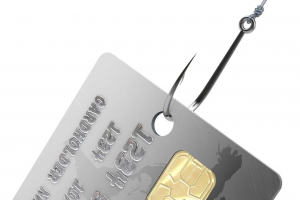How many times have you gone to make a payment online, only to have it blocked by your bank? It may be frustrating and inconvenient, but it’s for your own protection. If your bank sees a transaction they think is suspicious, they will block it.
In today’s internet age, identity theft is on the rise. If you think it will never happen to you, then think again. You’d be surprised at how easy it is for someone to steal your identity.
Here’s a look at how it works, and what you can do to avoid falling victim to fraudsters.
What Is Identity Theft?
Anything that displays your personal information puts you at risk of identity theft. Fraudsters can use your address or bank and credit card details to borrow money in your name, running up thousands of pounds in debt and leaving you to sort out the mess.
The most common items targeted by fraudsters are:

- Bank and credit card statements
- Official ID such as a driving licence or passport
- Access to your Facebook account
- Phishing emails that you unwittingly fall prey to
- Your CV
- Online banking information.
- Tips To Avoid Identity Theft
If you move house, inform official sources such as the bank and credit card companies immediately. For other mail, keep a re-direction order active for a least a year. Cancel paper statements and keep ID documents together in a safe place. Don’t reply to suspicious emails, especially those that want to re-direct you to banking site links. Periodically change your Facebook password and set privacy settings to ‘friends’ only. Make sure your mailbox is lockable and has a hand-proof opening.
If you’d like to find out more about ways of preventing identity theft, or if you’re concerned you may be a victim, then Insight Investigations can help. Contact us today for more information.
Who is at risk of identity theft?
Identity theft is one of the most common crimes of the 21st century. The advent of the internet has seen a massive rise in identity theft where hackers are finding it increasingly easy to get passwords, obtain personal information and then impersonate their victims. Applying for credit cards and then running up huge debts is a typical scenario and they are fairly indiscriminate about who they target.
Fraudsters used to focus on wealthy targets but they have now extended their reach to a much wider audience, particularly hitting young professionals and also people who are less well-off and who have lifestyles that make their personal information more vulnerable.
Young professionals who live in big cities often live in rented accommodation that has shared hallways and fraudsters are now targeting these locations because it is much easier to intercept mail and obtain addresses and personal details.
Not surprisingly, London is regarded as the identity theft capital in the UK. According to Experian, you are 4 times more likely to have your identity stolen if you live in London. Other major cities that are high on the list include Birmingham, Edinburgh and Glasgow.
The fact is, we are all potentially vulnerable to identity theft. We all use computers, tablets and mobiles for shopping and probably sharing more information than we should on social media. On top of this, many of us still receive our bank statements and credit card bills in the post and if these get intercepted, it gives fraudsters easy access to our personal details.
If you believe you have been a victim of identity theft and need to compile evidence to support your case then please get in touch. We will carry out a thorough Investigation on your behalf and make every effort to uncover who has stolen your ID, and present the evidence to you in a comprehensive report that will be admissible in court. Contact us now to discuss your case.
Computer Monitoring
Barely a week goes by without at least one news story about a new online scam. It seems the criminals are always one step ahead, and will try anything to catch out the unwary.
It’s not surprising really because we now do so much online, from banking to shopping to chatting on forums and social media, the internet gives the criminal fraternity plenty of scope.

Online Identity Theft
In most instances, scammers are trying to steal details about your identity in order to defraud you or other people of hard-earned cash. The key is to be mindful of this when you use the internet and to follow these straight-forward rules to protect yourself and anyone else in your family who uses the internet.
- Be aware
Simply knowing that the internet is used by scammers is helpful in avoiding becoming their next victim. It keeps you on your guard, so when you receive suspicious emails or land on a website which looks suspicious, you’ll think twice before proceeding further. - Invest in security software
You don’t have to spend a fortune to get good, basic security software for your computer. The level of protection you need will depend on how you use the internet – PC World have a good blog post to explain how to choose the right security software for your PC. Install the software that’s right for you, and then make sure you keep it up-to-date! - Don’t open suspicious emails
If you receive an email from someone you don’t know, and with a subject line which strikes you as irrelevant or odd, don’t open it – the email could contain a virus which will damage your computer.
The same goes for any email which promises to make you rich overnight. Shame though it is, this is a common technique by scammers. They often request online bank account details, or promise to make you rich in return for sending hard cash through the post – don’t fall for it! - Take care when revealing personal details online
Restrict the amount of personal information you disclose when online, especially when using social media sites. While you may prefer to be fully open about where you are going and what you are doing, this information can be extremely helpful to scammers. - Check your bank statements
Banks usually provide excellent security measures but it’s well worth getting into the habit of checking your statements to ensure your account is not being accessed by anyone else. Shred any documents containing your personal details.
If you think you’ve been a victim of identity theft, or to find out more about our identity theft investigations, please get in touch.


